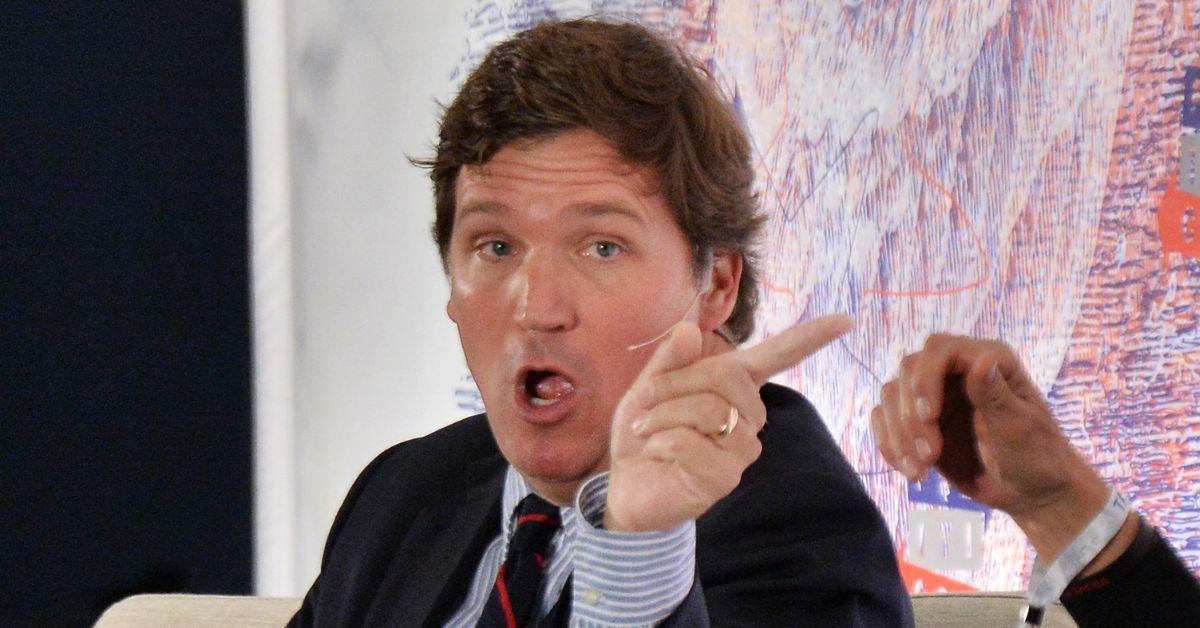Tucker Carlson On Israel Gaza War: A Deep Dive Into The Controversy And Perspective
When Tucker Carlson speaks, the world listens—or at least a significant portion of it does. His take on the Israel Gaza war has sparked heated debates, polarizing opinions, and raising important questions about geopolitical conflicts. As tensions rise in the Middle East, Carlson's commentary offers a unique lens through which we can explore the complexities of this war. In this article, we'll break down his perspective, the facts behind the conflict, and why it matters to you.
Tensions between Israel and Gaza have been simmering for decades, but recent escalations have brought the issue back into the global spotlight. Tucker Carlson, known for his bold and often controversial opinions, has weighed in on the matter. His perspective isn't just about politics; it's about understanding the human cost and the broader implications of the war.
Whether you agree with Carlson or not, his insights provide a valuable starting point for discussions about peace, justice, and international relations. So, buckle up because we're diving deep into the heart of the matter, exploring the nuances, and uncovering the truth behind Tucker Carlson's stance on the Israel Gaza war.
Read also:Lightning Vs Golden Knights The Ultimate Showdown Every Hockey Fan Needs To Know
Who is Tucker Carlson?
Biography and Background
Before we dive into his views on the Israel Gaza war, let's get to know the man behind the microphone. Tucker Carlson is an American television host, conservative commentator, and author. Born on November 1, 1969, in Stanford, California, he has carved out a niche as one of the most influential voices in American media today.
Carlson's career began in journalism, where he worked for prominent publications like The Weekly Standard and The New York Times. Over the years, he transitioned into television, hosting shows on CNN and MSNBC before finding his current home at Fox News. His nightly show, "Tucker Carlson Tonight," has consistently ranked among the top-rated programs in cable news.
His influence extends beyond television. Carlson is known for his outspoken views on a wide range of topics, from politics and economics to culture and social issues. His ability to connect with audiences has made him a household name, particularly among conservative circles.
Data and Facts
| Name | Tucker Carlson |
|---|---|
| Birth Date | November 1, 1969 |
| Birthplace | Stanford, California, USA |
| Profession | Television Host, Commentator, Author |
| Education | Harvard University (B.A.) |
Understanding the Israel Gaza War
Historical Context
The conflict between Israel and Gaza is deeply rooted in history. It all began after the establishment of the State of Israel in 1948, which led to the displacement of thousands of Palestinians. Over the years, tensions escalated into full-scale wars, with numerous attempts at peace failing to bring lasting resolution.
Gaza, controlled by the militant group Hamas since 2007, has been a focal point of the conflict. Israel's security concerns and Hamas's resistance to Israeli occupation have resulted in cycles of violence, with civilians on both sides bearing the brunt of the suffering.
Recent Developments
In recent months, the situation has taken a turn for the worse. Rocket attacks from Gaza into Israel have increased, prompting retaliatory strikes by the Israeli Defense Forces (IDF). The result? A humanitarian crisis that has captured the world's attention.
Read also:Sweet Sixteen Schedule The Ultimate Guide To March Madness Magic
According to reports from the United Nations, thousands of civilians have been displaced, and the death toll continues to rise. The international community is calling for an immediate ceasefire, but the path to peace remains uncertain.
Tucker Carlson's Perspective
The Root of the Conflict
Carlson's analysis of the Israel Gaza war centers around the root causes of the conflict. He argues that the issue is not just about borders or land but about ideology and identity. In his view, Hamas's refusal to recognize Israel's right to exist is a fundamental obstacle to peace.
He often emphasizes the importance of addressing the underlying grievances that fuel the conflict. This includes economic disparities, political oppression, and the lack of opportunities for Palestinians living in Gaza.
Blame Game
One of the most controversial aspects of Carlson's commentary is his stance on who's to blame. He doesn't shy away from pointing fingers, often criticizing both sides for their actions. However, he places particular emphasis on Hamas's role in perpetuating violence.
Carlson argues that Hamas uses civilians as human shields, deliberately placing them in harm's way to garner international sympathy. This tactic, he believes, undermines genuine efforts to achieve peace.
A Call for Accountability
Carlson advocates for accountability on all fronts. He believes that the international community, including the United States, must hold both Israel and Hamas accountable for their actions. This includes ensuring that aid meant for humanitarian purposes isn't diverted to fund military operations.
His call for transparency and accountability resonates with many who feel that the current system allows for impunity. By shining a light on these issues, Carlson hopes to spark meaningful change.
Impact on Global Politics
U.S. Foreign Policy
The Israel Gaza war has significant implications for U.S. foreign policy. As a staunch supporter of Israel, the U.S. government faces criticism for its one-sided approach. Tucker Carlson often addresses this issue, questioning the moral and ethical implications of U.S. involvement.
He argues that the U.S. should adopt a more balanced stance, one that acknowledges the legitimate concerns of both Israelis and Palestinians. This approach, he believes, could pave the way for more constructive dialogue and eventual peace.
International Relations
Beyond the U.S., the conflict affects global relations in profound ways. European countries, Arab nations, and other global powers are all stakeholders in the outcome. Carlson's commentary highlights the need for a coordinated international effort to resolve the conflict.
He often cites examples of successful peace negotiations in other parts of the world, suggesting that similar strategies could be applied to the Israel Gaza war. By learning from past successes and failures, the international community can work towards a more sustainable peace.
Humanitarian Concerns
The Cost of War
At the heart of the Israel Gaza war is the human cost. Thousands of lives have been lost, and many more have been forever changed by the violence. Tucker Carlson addresses this aspect with empathy, acknowledging the suffering of innocent civilians caught in the crossfire.
He emphasizes the need for humanitarian aid and support for those affected by the conflict. This includes providing shelter, food, and medical care to displaced families and ensuring that basic human rights are upheld.
Long-Term Solutions
Carlson believes that long-term solutions require addressing the root causes of the conflict. This includes investing in education, healthcare, and economic development in Gaza. By improving the quality of life for Palestinians, the cycle of violence can be broken.
He also advocates for dialogue and reconciliation, encouraging leaders on both sides to come to the table and work towards a lasting peace agreement. While the road ahead may be long and difficult, Carlson remains optimistic about the possibility of change.
Public Reaction
Support and Criticism
As with any controversial topic, Tucker Carlson's views on the Israel Gaza war have sparked both support and criticism. His supporters appreciate his willingness to tackle tough issues and provide a platform for underrepresented voices.
On the other hand, his critics accuse him of oversimplifying complex issues and taking a biased stance. They argue that his commentary often lacks nuance and fails to consider the perspectives of all parties involved.
Impact on Public Discourse
Regardless of where you stand, Carlson's commentary has undoubtedly influenced public discourse on the Israel Gaza war. By bringing attention to the issue, he has sparked important conversations about peace, justice, and human rights.
His ability to engage audiences and provoke thought has made him a key player in shaping public opinion. Whether you agree with him or not, his influence cannot be ignored.
Conclusion
In conclusion, Tucker Carlson's take on the Israel Gaza war offers a unique perspective that challenges us to think critically about the conflict. By addressing the root causes, holding all parties accountable, and advocating for humanitarian solutions, he provides a roadmap for achieving lasting peace.
So, what can you do? Start by educating yourself on the issues, engaging in respectful dialogue with others, and supporting organizations working towards peace. Together, we can make a difference and help bring an end to the suffering in the Middle East.
Feel free to leave your thoughts in the comments below or share this article with others who might find it insightful. The more we talk about these issues, the closer we get to finding solutions.
Table of Contents
- Who is Tucker Carlson?
- Understanding the Israel Gaza War
- Tucker Carlson's Perspective
- Impact on Global Politics
- Humanitarian Concerns
- Public Reaction
- Conclusion
Sub-Sections
Article Recommendations


